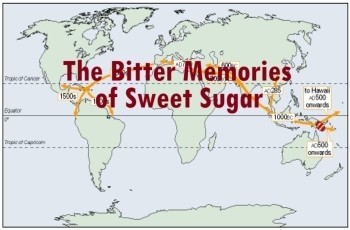シンクタンクからの眼 2025年4月26日
砂糖の甘美な誘惑とそこに潜む苦い記憶 The Sweet Temptation of Sugar and the Bitter Memories It Conceals

今回は『賢者コラム Wisdom Columns』として、アジア北方史研究の巨匠として知られる黄有福先生の寄稿文をご紹介いたします。
砂糖の甘美な誘惑と、そこに潜む苦い記憶
― 欲望、支配、そして人間の歴史を映す結晶 ―
現代人の日常生活において、砂糖は欠かすことのできない調味料である。しかし、その小さな白い結晶の背後には、数千年にわたる人類の欲望、植民地主義、そして戦争の記憶が刻まれている。砂糖の歴史は、単なる食材の伝播にとどまらず、世界の経済・政治・社会構造を変革してきた壮大な叙事詩である。
「蜜蜂のいない蜜」:古代インドにおける発見
砂糖の歴史は、紀元前327年、アレクサンドロス大王のインド遠征にまで遡る。当時、将軍ネアルコスは、インダス川流域で「蜜蜂なしで蜜を生む葦」、すなわちサトウキビに出会い、その甘味に驚嘆した。この発見は、砂糖が西洋世界に伝播する端緒となった。インドの古代文献には、サトウキビを煮沸し糖蜜、さらに固形糖を作る技術が記されている。これらは単なる製法ではなく、自然観や宗教的実践と密接に結びついた知の体系であった。
イスラム帝国と製糖技術の拡散
6世紀以降、サトウキビはペルシャを経て、イスラム帝国の拡大と共に中東、北アフリカへと伝播した。征服地にサトウキビを持ち込んだムスリムたちは、農業と製糖の技術を拡張し、やがてスペイン南部アンダルシアにおいて本格的な栽培が始まった。この過程で砂糖は、医学的効能を持つ物質としても認識され、知識の体系の中に組み込まれていく。砂糖はここで、単なる甘味料以上の意味を帯びていたのである。
十字軍遠征とヨーロッパへの伝来
11世紀から13世紀にかけての十字軍遠征は、砂糖の製造技術がヨーロッパにもたらされる契機となった。ヨーロッパ人はアラブ世界から製糖法を学び、シチリアやキプロスなどの地中海地域でサトウキビ栽培を開始した。特にヴェネツィア商人たちは精製技術に長け、砂糖を高級品として取引することにより莫大な富を得た。この富は、のちにルネサンスの芸術や学問を支える資本として機能することになる。
大航海時代とプランテーション経済の成立
15世紀以降の大航海時代、サトウキビはポルトガルやスペインによってアフリカ、ブラジル、中南米へと移植され、大規模なプランテーションが築かれた。特にブラジルでは、オランダに亡命したユダヤ人が中心となり砂糖産業が形成された。しかし、1645年のポルトガルによる再征服により、彼らはカリブ海諸島へ移住し、新たな製糖拠点を築いた。ここでアフリカから連れてこられた黒人奴隷が労働力として投入され、「砂糖・奴隷・タバコ」の三角貿易が確立された。
砂糖を巡る帝国間戦争
17世紀、砂糖貿易をめぐりイギリスとオランダの間で三度にわたる英蘭戦争が勃発した。1652年、イギリス軍がバルバドス島周辺でオランダ船を拿捕した事件をきっかけに第一次英蘭戦争が始まり、1655年にはイギリスが勝利を収めた。これにより砂糖貿易の覇権はイギリスに移り、カリブ海地域はイギリスの植民地支配のもとでプランテーション経済に組み込まれていく。18世紀には、砂糖がヨーロッパの輸入品の約20%を占めるまでに成長した。
ビート糖の登場と構造の転換
19世紀初頭、ナポレオン戦争下での大陸封鎖により、フランスは海外からのサトウキビ輸入が困難となった。これにより甜菜(ビート)から糖分を抽出する技術が急速に発展し、ヨーロッパ各地でビート糖の生産が始まった。この技術革新は、砂糖の生産構造を一変させ、供給源の多様化を促進した。砂糖はもはや植民地に依存するものではなく、技術と国家政策によって国内生産が可能な工業製品となったのである。
砂糖の結晶に刻まれた記憶
現代において、私たちが無意識に摂取している砂糖の一粒には、インドの知識、イスラムの科学、ヨーロッパの資本、アフリカの苦難、そして帝国主義の野望が封じ込められている。砂糖とは、人間の欲望が制度を生み、社会を動かし、倫理を問う存在であったのだ。
砂糖の甘さの中に潜む苦味こそが、私たちに問いを投げかける。私たちは、何を消費し、何を記憶し、何を忘却してきたのか?砂糖の歴史とは、人類の文明の軌跡そのものなのである。
(黄 有福、中国中央民族大学名誉教授・元ハーバード大学招聘教授)
The Sweet Temptation of Sugar and the Bitter Memories It Conceals
— Crystals That Reflect Desire, Domination, and Human History —
In modern daily life, sugar is an indispensable ingredient. However, behind its small, white crystals lie thousands of years of human desire, colonialism, and the memories of war. The history of sugar is not merely a story of a food product’s dissemination—it is an epic saga that has transformed the world’s economic, political, and social structures.
"Honey Without Bees": Discovery in Ancient India
The history of sugar dates back to 327 BCE, during Alexander the Great’s campaign in India. At that time, his general Nearchus encountered “a reed that produces honey without bees” along the Indus River—sugarcane—and was astonished by its sweetness. This discovery marked the beginning of sugar’s transmission to the Western world. Ancient Indian texts describe the techniques of boiling sugarcane juice to produce molasses and then crystallized sugar. These were not just manufacturing methods but were deeply intertwined with views of nature and religious practices—a comprehensive body of knowledge.
The Islamic Empire and the Spread of Sugar-Making Techniques
From the 6th century onward, sugarcane spread from Persia to the Middle East and North Africa with the expansion of the Islamic Empire. Muslims brought sugarcane to conquered lands, developing agriculture and refining techniques. Eventually, large-scale cultivation began in Andalusia, southern Spain. During this process, sugar was also recognized for its medicinal properties and incorporated into established knowledge systems. Here, sugar came to signify much more than just a sweetener.
The Crusades and the Arrival of Sugar in Europe
Between the 11th and 13th centuries, the Crusades served as a conduit for sugar-making technology to reach Europe. Europeans learned sugar production methods from the Arab world and began cultivating sugarcane in Mediterranean regions such as Sicily and Cyprus. Venetian merchants, in particular, excelled in refining techniques and gained immense wealth by trading sugar as a luxury item. This wealth later became capital that supported Renaissance art and scholarship.
The Age of Exploration and the Rise of the Plantation Economy
From the 15th century, during the Age of Exploration, sugarcane was transplanted to Africa, Brazil, and Central and South America by Portugal and Spain, leading to the creation of large plantations. In Brazil, Jewish refugees from the Netherlands played a central role in developing the sugar industry. After Portugal re-conquered the region in 1645, these individuals moved to the Caribbean, establishing new sugar-producing centers. African slaves were brought in as laborers, and the “sugar-slave-tobacco” triangular trade was established.
Imperial Wars Over Sugar
In the 17th century, Britain and the Netherlands fought three Anglo-Dutch Wars over sugar trade. The first war began in 1652 when the British captured Dutch ships near Barbados, and by 1655, Britain emerged victorious. As a result, Britain seized dominance over the sugar trade, and the Caribbean region became integrated into the British plantation economy. By the 18th century, sugar accounted for approximately 20% of Europe’s imports.
The Rise of Beet Sugar and Structural Transformation
In the early 19th century, the Napoleonic Wars and the Continental Blockade made it difficult for France to import sugarcane from overseas. This spurred the rapid development of techniques to extract sugar from beets, and beet sugar production began across Europe. This technological innovation drastically altered sugar production structures, promoting supply diversification. Sugar was no longer a colonial product—it became an industrial good, producible domestically through technology and national policy.
Crystals Engraved with Memory
Today, each grain of sugar we consume unconsciously contains the knowledge of India, the science of Islam, European capital, African suffering, and the ambitions of imperialism. Sugar is a substance that, through human desire, has created systems, driven societies, and posed ethical questions.
It is the bitterness hidden within its sweetness that challenges us: What do we consume, what do we remember, and what have we forgotten? The history of sugar is the very trajectory of human civilization.
(Namhoson Youfu Hwang, Professor Emeritus at Minzu University of China; Former Visiting Professor at Harvard University)




